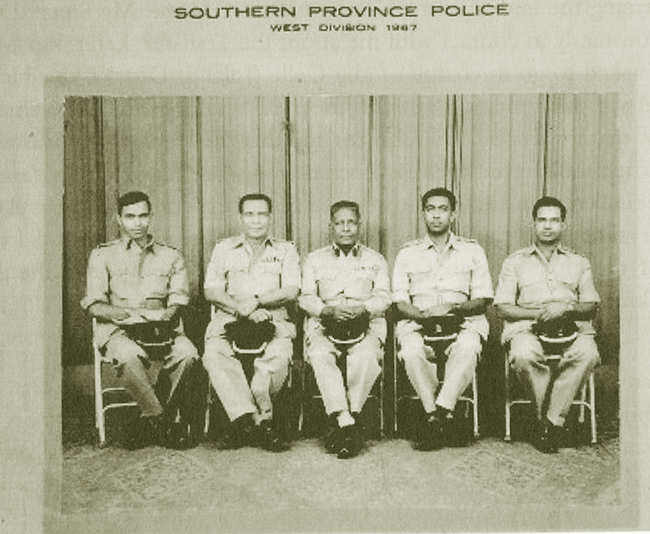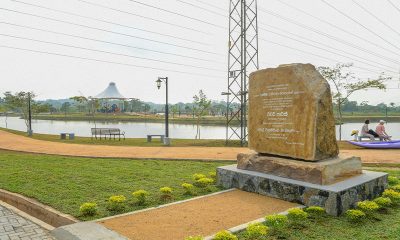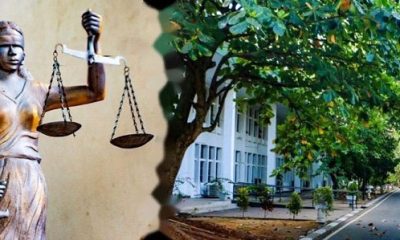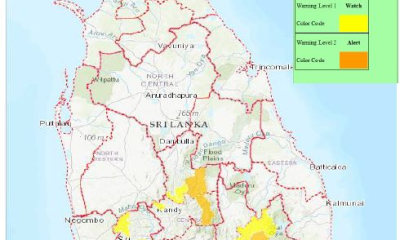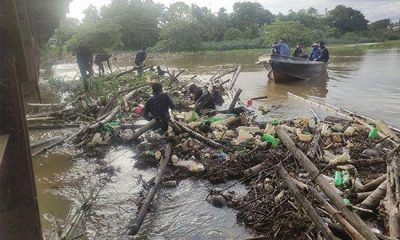Features
An experience at Bibile and Galle MP Dahanayaka scolding me for late night call
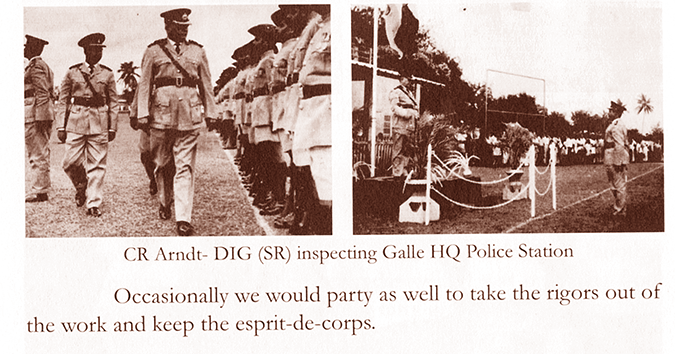
(Excerpted from the memoirs of Senior DIG (Retd.) Kingsley Wickramasuriya)
Another interesting episode was the complaint I received against Bibile Police station. According to a petition addressed to me, it was alleged that the complainant was beaten up by another party when he went to Bibile on some business and with the assistance of the police, a case had been filed in MC Moneragala against him, manipulating the facts, whereas he was the real victim.
On the face of it, I saw some injustice had been done and decided to investigate. Since the allegations were pointing the finger at the OIC and his staff, I decided to take HQI Badulla for the investigation. But as the HQI was unavailable, I decided to take the next senior officer available who happened to be a senior SI. We proceeded to Bibile police station and started our investigation.
The evidence collected revealed that the complainant had been thoroughly beaten up by his political opponents causing him grievous injuries and that Bibile Police had aided and abetted them by filing a case in MC Moneragal against the complainant making him an accused. On the evidence available those civilians responsible for the serious crimes committed and the police officers who aided and abetted were all arrested and were to be taken to Badulla to be produced in Courts the next day.
As we were nearing the completion of the investigation the MP for Bibile appeared at the police station and requested bail for the civilian suspects. When he was told that the offenses committed by the suspects were serious, bail was not permissible and that they had to be produced in courts, he was not pleased at all and left the station swearing to get them out.
A little later I received information that an attempt would be made to rescue the suspects being taken to Badulla. I called OIC Lunugala to send a backup party so that any rescue attempt will be thwarted. Eventually, the suspects were taken to Badulla and remanded the following day.
Early next morning, the SP was on the phone. He called me at home and was furious that I had remanded ‘his police officers’ and questioned how dare I resorted to that type of action without asking him. What I learned from his conversation was that I had created a politically explosive situation by taking action against the errant parties and that complaints had been made to the political bosses in Colombo.
I was later to learn that it was home and a home affair in that the complainant party belonged to Prime Minister Dudley Senanayake’s faction and the accused party was a follower of the faction belonging to the Minister of State J.R. Jayewardene. They in turn had taken up the matter with the IG and that is why the SP was upset. He calmed down when he heard my side of the story and called for a report.
I prepared a report on the incident and submitted it to the SP the same day. On reading the report the SP was in complete agreement with the action taken by me and made his recommendation to IG Eleric Abeygunawardena through the Range DIG, AC Dep. Back came the file from IG with strictures against the OIC directing that disciplinary action be taken against him.
In spite of that, I received transfer orders out of the Badulla Division to the Intelligence Services Division, confirming the faith that the department had in me. My Range DIG was constantly in contact with me about the transfer. Later, however, I was asked to go in charge of the Galle (Inland) District to which I agreed without hesitation knowing the predicament of the department.
I knew that it was not a punishment and that the department backed me. When transferred even at short intervals I never protested. I took it as a challenge and an opportunity to gather experience and travel the countryside. I was the winner for by the time I reached the top I was one of the most experienced officers that had gone through the mill and I knew every aspect of the department.
On the day of the transfer when I called on the SP to bid him farewell, he told me that when I came on transfer to the District my reputation had preceded me that, I was supposed to be an SLFP supporter. So, he was watchful to see whether I would work on party lines. But having watched me closely he was convinced that I had no party politics and that I did my duty impartially. He wished me well. We departed as friends which lasted even after his retirement and until his demise.
Galle
Superintendent Baba Ram Dole was in charge of the Galle Division at the time I reported there. Later on, Superintendent Y.D. Senarath took over from him. Galle Division consisted of Galle (Coastal), Galle (Inland), and Ambalangoda Police Districts. Superintendent Dole was a father figure and carried no political prejudices against me. I replaced ASP Wijesinghe (Galle Inland) popularly known as Lanka Matha on his sudden demise.
There again I had several police stations to look after, starting from Baddegama, Poddala, Nagoda, Hiniduma, Yakkalamulla, and eventually when I took over Galle Coastal District I had to look after Galle, Galle (Harbour), Hikkaduwa, Habaraduwa, and Ahangama. Galle (Inland) was a rural district mostly surrounded by tea and rubber estates while the Coastal District was a different kettle of fish with seafaring folks and an urban population to deal with.
As usual, I kept the district alert with my surprise visits day and night keeping the errant officers in their place. On one of the visits in the middle of the night to Hikkaduwa Police Station, I checked on one of the night patrols in the vicinity and traced one of the patrolling officers to his quarters fast asleep. I took him along with me to the police station and was recording his statement when the other partner appeared at the station with a cooked-up story to my amusement. Both were interdicted on the spot for neglect of duty etc. and were later dealt with disciplinarily.
On another occasion, while I was in office a person known to be an Island Reconvicted Criminal (IRC) appeared before me with information of the complicity of a police constable attached to the Crime Branch of the Galle HQ station in the picking of pockets taking place at the Galle bus stand. Having taken serious notice of the information given I called the OIC, DIB (District Intelligence Bureau), and asked him to verify the information.
He went out to the town and returned and confirmed the information giving it credibility. He had found out that there had been an incident of picking a pocket at the bus stand, and that a PC attached to the Crime Branch of the Galle HQ Police station had traced the offender and returned the wallet to the complainant without even recording his statement and thereby letting the offender go Scot-free.
This was a suppression of a Crime, a serious departmental lapse.
The constable concerned had earned a good name in the branch and the affection of his superiors as a hardworking officer who was doing well. Because of his good record, I called the constable to my office, confronted him with the information, and asked him to own up before starting an official investigation so that he would have the chance of mitigation. Despite repeated warnings, he denied the allegations.
I then started investigations in earnest during which I found that the victim of the crime could not be traced to record his statement as his contact details were not available. Later I came to know that the PC who had his contact details had persuaded him against coming forward, thinking that that would deter me from taking disciplinary action. I completed my investigations without the statement from the victim and interdicted the PC on the available evidence.
At the disciplinary inquiry held against him later, he took up the defense that the charges cannot proceed without a complainant (meaning of the victim). I, however, took up the position that I represented the department as the complainant, being the injured party suffering loss of reputation or ill fame in the eyes of the public. The file went up to the Range DIG who recognizing the seriousness of the offense dismissed the PC from the service. This was a good eye-opener for those officers who gave the PC wrong advice on misplaced sympathy.
Another interesting incident from my stay in Galle was my interaction with the MP for Galle. Dr. W Dahanayake, a former prime minister and a legendary character known for tolerating no nonsense from any public servant. Many a police officer had got marching orders due to his intervention. However, I have had no brush with him. His nephew, Vijaya Dahanayake, was his Secretary. Vijaya was a thorough gentleman and an amenable person who knew to give respect where it was due.
On several instances, he would talk to me on behalf of his uncle over matters relating to the constituents of his electorate. I had no problem looking after them to his satisfaction if it was something that I could do according to the law. If not, I would tell him why and he understood. Dr. Dahanayke and Vijaya both appreciated forthrightness. It became clear to me that those who got into hot water with the MP were those who were not forthright in their dealings.
One night around 7.30 pm Dr. Dahanayake called me home over the phone and informed me of a complaint of assault by Habaraduwa Police on one of his constituents. I immediately got down the complainant party to Galle Police Station, recorded their statements, and proceeded to Habaraduwa police station. After having completed the investigation came back and phoned the MP to inform him of the results of my investigation.
The person alleged to have been assaulted by the police was a wanted criminal who had been arrested by the police on a complaint of house breaking and theft for which no police bail was available. I could barely finish giving him the account when he dismissed me angrily for disturbing him late at night. When I completed the investigation no further action could be taken owing to the contradictory statements of the witnesses.
Features
The heart-friendly health minister

by Dr Gotabhya Ranasinghe
Senior Consultant Cardiologist
National Hospital Sri Lanka
When we sought a meeting with Hon Dr. Ramesh Pathirana, Minister of Health, he graciously cleared his busy schedule to accommodate us. Renowned for his attentive listening and deep understanding, Minister Pathirana is dedicated to advancing the health sector. His openness and transparency exemplify the qualities of an exemplary politician and minister.
Dr. Palitha Mahipala, the current Health Secretary, demonstrates both commendable enthusiasm and unwavering support. This combination of attributes makes him a highly compatible colleague for the esteemed Minister of Health.
Our discussion centered on a project that has been in the works for the past 30 years, one that no other minister had managed to advance.
Minister Pathirana, however, recognized the project’s significance and its potential to revolutionize care for heart patients.
The project involves the construction of a state-of-the-art facility at the premises of the National Hospital Colombo. The project’s location within the premises of the National Hospital underscores its importance and relevance to the healthcare infrastructure of the nation.
This facility will include a cardiology building and a tertiary care center, equipped with the latest technology to handle and treat all types of heart-related conditions and surgeries.
Securing funding was a major milestone for this initiative. Minister Pathirana successfully obtained approval for a $40 billion loan from the Asian Development Bank. With the funding in place, the foundation stone is scheduled to be laid in September this year, and construction will begin in January 2025.
This project guarantees a consistent and uninterrupted supply of stents and related medications for heart patients. As a result, patients will have timely access to essential medical supplies during their treatment and recovery. By securing these critical resources, the project aims to enhance patient outcomes, minimize treatment delays, and maintain the highest standards of cardiac care.
Upon its fruition, this monumental building will serve as a beacon of hope and healing, symbolizing the unwavering dedication to improving patient outcomes and fostering a healthier society.We anticipate a future marked by significant progress and positive outcomes in Sri Lanka’s cardiovascular treatment landscape within the foreseeable timeframe.
Features
A LOVING TRIBUTE TO JESUIT FR. ALOYSIUS PIERIS ON HIS 90th BIRTHDAY

by Fr. Emmanuel Fernando, OMI
Jesuit Fr. Aloysius Pieris (affectionately called Fr. Aloy) celebrated his 90th birthday on April 9, 2024 and I, as the editor of our Oblate Journal, THE MISSIONARY OBLATE had gone to press by that time. Immediately I decided to publish an article, appreciating the untiring selfless services he continues to offer for inter-Faith dialogue, the renewal of the Catholic Church, his concern for the poor and the suffering Sri Lankan masses and to me, the present writer.
It was in 1988, when I was appointed Director of the Oblate Scholastics at Ampitiya by the then Oblate Provincial Fr. Anselm Silva, that I came to know Fr. Aloy more closely. Knowing well his expertise in matters spiritual, theological, Indological and pastoral, and with the collaborative spirit of my companion-formators, our Oblate Scholastics were sent to Tulana, the Research and Encounter Centre, Kelaniya, of which he is the Founder-Director, for ‘exposure-programmes’ on matters spiritual, biblical, theological and pastoral. Some of these dimensions according to my view and that of my companion-formators, were not available at the National Seminary, Ampitiya.
Ever since that time, our Oblate formators/ accompaniers at the Oblate Scholasticate, Ampitiya , have continued to send our Oblate Scholastics to Tulana Centre for deepening their insights and convictions regarding matters needed to serve the people in today’s context. Fr. Aloy also had tried very enthusiastically with the Oblate team headed by Frs. Oswald Firth and Clement Waidyasekara to begin a Theologate, directed by the Religious Congregations in Sri Lanka, for the contextual formation/ accompaniment of their members. It should very well be a desired goal of the Leaders / Provincials of the Religious Congregations.
Besides being a formator/accompanier at the Oblate Scholasticate, I was entrusted also with the task of editing and publishing our Oblate journal, ‘The Missionary Oblate’. To maintain the quality of the journal I continue to depend on Fr. Aloy for his thought-provoking and stimulating articles on Biblical Spirituality, Biblical Theology and Ecclesiology. I am very grateful to him for his generous assistance. Of late, his writings on renewal of the Church, initiated by Pope St. John XX111 and continued by Pope Francis through the Synodal path, published in our Oblate journal, enable our readers to focus their attention also on the needed renewal in the Catholic Church in Sri Lanka. Fr. Aloy appreciated very much the Synodal path adopted by the Jesuit Pope Francis for the renewal of the Church, rooted very much on prayerful discernment. In my Religious and presbyteral life, Fr.Aloy continues to be my spiritual animator / guide and ongoing formator / acccompanier.
Fr. Aloysius Pieris, BA Hons (Lond), LPh (SHC, India), STL (PFT, Naples), PhD (SLU/VC), ThD (Tilburg), D.Ltt (KU), has been one of the eminent Asian theologians well recognized internationally and one who has lectured and held visiting chairs in many universities both in the West and in the East. Many members of Religious Congregations from Asian countries have benefited from his lectures and guidance in the East Asian Pastoral Institute (EAPI) in Manila, Philippines. He had been a Theologian consulted by the Federation of Asian Bishops’ Conferences for many years. During his professorship at the Gregorian University in Rome, he was called to be a member of a special group of advisers on other religions consulted by Pope Paul VI.
Fr. Aloy is the author of more than 30 books and well over 500 Research Papers. Some of his books and articles have been translated and published in several countries. Among those books, one can find the following: 1) The Genesis of an Asian Theology of Liberation (An Autobiographical Excursus on the Art of Theologising in Asia, 2) An Asian Theology of Liberation, 3) Providential Timeliness of Vatican 11 (a long-overdue halt to a scandalous millennium, 4) Give Vatican 11 a chance, 5) Leadership in the Church, 6) Relishing our faith in working for justice (Themes for study and discussion), 7) A Message meant mainly, not exclusively for Jesuits (Background information necessary for helping Francis renew the Church), 8) Lent in Lanka (Reflections and Resolutions, 9) Love meets wisdom (A Christian Experience of Buddhism, 10) Fire and Water 11) God’s Reign for God’s poor, 12) Our Unhiddden Agenda (How we Jesuits work, pray and form our men). He is also the Editor of two journals, Vagdevi, Journal of Religious Reflection and Dialogue, New Series.
Fr. Aloy has a BA in Pali and Sanskrit from the University of London and a Ph.D in Buddhist Philosophy from the University of Sri Lankan, Vidyodaya Campus. On Nov. 23, 2019, he was awarded the prestigious honorary Doctorate of Literature (D.Litt) by the Chancellor of the University of Kelaniya, the Most Venerable Welamitiyawe Dharmakirthi Sri Kusala Dhamma Thera.
Fr. Aloy continues to be a promoter of Gospel values and virtues. Justice as a constitutive dimension of love and social concern for the downtrodden masses are very much noted in his life and work. He had very much appreciated the commitment of the late Fr. Joseph (Joe) Fernando, the National Director of the Social and Economic Centre (SEDEC) for the poor.
In Sri Lanka, a few religious Congregations – the Good Shepherd Sisters, the Christian Brothers, the Marist Brothers and the Oblates – have invited him to animate their members especially during their Provincial Congresses, Chapters and International Conferences. The mainline Christian Churches also have sought his advice and followed his seminars. I, for one, regret very much, that the Sri Lankan authorities of the Catholic Church –today’s Hierarchy—- have not sought Fr.
Aloy’s expertise for the renewal of the Catholic Church in Sri Lanka and thus have not benefited from the immense store of wisdom and insight that he can offer to our local Church while the Sri Lankan bishops who governed the Catholic church in the immediate aftermath of the Second Vatican Council (Edmund Fernando OMI, Anthony de Saram, Leo Nanayakkara OSB, Frank Marcus Fernando, Paul Perera,) visited him and consulted him on many matters. Among the Tamil Bishops, Bishop Rayappu Joseph was keeping close contact with him and Bishop J. Deogupillai hosted him and his team visiting him after the horrible Black July massacre of Tamils.
Features
A fairy tale, success or debacle

Sri Lanka-Singapore Free Trade Agreement
By Gomi Senadhira
senadhiragomi@gmail.com
“You might tell fairy tales, but the progress of a country cannot be achieved through such narratives. A country cannot be developed by making false promises. The country moved backward because of the electoral promises made by political parties throughout time. We have witnessed that the ultimate result of this is the country becoming bankrupt. Unfortunately, many segments of the population have not come to realize this yet.” – President Ranil Wickremesinghe, 2024 Budget speech
Any Sri Lankan would agree with the above words of President Wickremesinghe on the false promises our politicians and officials make and the fairy tales they narrate which bankrupted this country. So, to understand this, let’s look at one such fairy tale with lots of false promises; Ranil Wickremesinghe’s greatest achievement in the area of international trade and investment promotion during the Yahapalana period, Sri Lanka-Singapore Free Trade Agreement (SLSFTA).
It is appropriate and timely to do it now as Finance Minister Wickremesinghe has just presented to parliament a bill on the National Policy on Economic Transformation which includes the establishment of an Office for International Trade and the Sri Lanka Institute of Economics and International Trade.
Was SLSFTA a “Cleverly negotiated Free Trade Agreement” as stated by the (former) Minister of Development Strategies and International Trade Malik Samarawickrama during the Parliamentary Debate on the SLSFTA in July 2018, or a colossal blunder covered up with lies, false promises, and fairy tales? After SLSFTA was signed there were a number of fairy tales published on this agreement by the Ministry of Development Strategies and International, Institute of Policy Studies, and others.
However, for this article, I would like to limit my comments to the speech by Minister Samarawickrama during the Parliamentary Debate, and the two most important areas in the agreement which were covered up with lies, fairy tales, and false promises, namely: revenue loss for Sri Lanka and Investment from Singapore. On the other important area, “Waste products dumping” I do not want to comment here as I have written extensively on the issue.
1. The revenue loss
During the Parliamentary Debate in July 2018, Minister Samarawickrama stated “…. let me reiterate that this FTA with Singapore has been very cleverly negotiated by us…. The liberalisation programme under this FTA has been carefully designed to have the least impact on domestic industry and revenue collection. We have included all revenue sensitive items in the negative list of items which will not be subject to removal of tariff. Therefore, 97.8% revenue from Customs duty is protected. Our tariff liberalisation will take place over a period of 12-15 years! In fact, the revenue earned through tariffs on goods imported from Singapore last year was Rs. 35 billion.
The revenue loss for over the next 15 years due to the FTA is only Rs. 733 million– which when annualised, on average, is just Rs. 51 million. That is just 0.14% per year! So anyone who claims the Singapore FTA causes revenue loss to the Government cannot do basic arithmetic! Mr. Speaker, in conclusion, I call on my fellow members of this House – don’t mislead the public with baseless criticism that is not grounded in facts. Don’t look at petty politics and use these issues for your own political survival.”
I was surprised to read the minister’s speech because an article published in January 2018 in “The Straits Times“, based on information released by the Singaporean Negotiators stated, “…. With the FTA, tariff savings for Singapore exports are estimated to hit $10 million annually“.
As the annual tariff savings (that is the revenue loss for Sri Lanka) calculated by the Singaporean Negotiators, Singaporean $ 10 million (Sri Lankan rupees 1,200 million in 2018) was way above the rupees’ 733 million revenue loss for 15 years estimated by the Sri Lankan negotiators, it was clear to any observer that one of the parties to the agreement had not done the basic arithmetic!
Six years later, according to a report published by “The Morning” newspaper, speaking at the Committee on Public Finance (COPF) on 7th May 2024, Mr Samarawickrama’s chief trade negotiator K.J. Weerasinghehad had admitted “…. that forecasted revenue loss for the Government of Sri Lanka through the Singapore FTA is Rs. 450 million in 2023 and Rs. 1.3 billion in 2024.”
If these numbers are correct, as tariff liberalisation under the SLSFTA has just started, we will pass Rs 2 billion very soon. Then, the question is how Sri Lanka’s trade negotiators made such a colossal blunder. Didn’t they do their basic arithmetic? If they didn’t know how to do basic arithmetic they should have at least done their basic readings. For example, the headline of the article published in The Straits Times in January 2018 was “Singapore, Sri Lanka sign FTA, annual savings of $10m expected”.
Anyway, as Sri Lanka’s chief negotiator reiterated at the COPF meeting that “…. since 99% of the tariffs in Singapore have zero rates of duty, Sri Lanka has agreed on 80% tariff liberalisation over a period of 15 years while expecting Singapore investments to address the imbalance in trade,” let’s turn towards investment.
Investment from Singapore
In July 2018, speaking during the Parliamentary Debate on the FTA this is what Minister Malik Samarawickrama stated on investment from Singapore, “Already, thanks to this FTA, in just the past two-and-a-half months since the agreement came into effect we have received a proposal from Singapore for investment amounting to $ 14.8 billion in an oil refinery for export of petroleum products. In addition, we have proposals for a steel manufacturing plant for exports ($ 1 billion investment), flour milling plant ($ 50 million), sugar refinery ($ 200 million). This adds up to more than $ 16.05 billion in the pipeline on these projects alone.
And all of these projects will create thousands of more jobs for our people. In principle approval has already been granted by the BOI and the investors are awaiting the release of land the environmental approvals to commence the project.
I request the Opposition and those with vested interests to change their narrow-minded thinking and join us to develop our country. We must always look at what is best for the whole community, not just the few who may oppose. We owe it to our people to courageously take decisions that will change their lives for the better.”
According to the media report I quoted earlier, speaking at the Committee on Public Finance (COPF) Chief Negotiator Weerasinghe has admitted that Sri Lanka was not happy with overall Singapore investments that have come in the past few years in return for the trade liberalisation under the Singapore-Sri Lanka Free Trade Agreement. He has added that between 2021 and 2023 the total investment from Singapore had been around $162 million!
What happened to those projects worth $16 billion negotiated, thanks to the SLSFTA, in just the two-and-a-half months after the agreement came into effect and approved by the BOI? I do not know about the steel manufacturing plant for exports ($ 1 billion investment), flour milling plant ($ 50 million) and sugar refinery ($ 200 million).
However, story of the multibillion-dollar investment in the Petroleum Refinery unfolded in a manner that would qualify it as the best fairy tale with false promises presented by our politicians and the officials, prior to 2019 elections.
Though many Sri Lankans got to know, through the media which repeatedly highlighted a plethora of issues surrounding the project and the questionable credentials of the Singaporean investor, the construction work on the Mirrijiwela Oil Refinery along with the cement factory began on the24th of March 2019 with a bang and Minister Ranil Wickremesinghe and his ministers along with the foreign and local dignitaries laid the foundation stones.
That was few months before the 2019 Presidential elections. Inaugurating the construction work Prime Minister Ranil Wickremesinghe said the projects will create thousands of job opportunities in the area and surrounding districts.
The oil refinery, which was to be built over 200 acres of land, with the capacity to refine 200,000 barrels of crude oil per day, was to generate US$7 billion of exports and create 1,500 direct and 3,000 indirect jobs. The construction of the refinery was to be completed in 44 months. Four years later, in August 2023 the Cabinet of Ministers approved the proposal presented by President Ranil Wickremesinghe to cancel the agreement with the investors of the refinery as the project has not been implemented! Can they explain to the country how much money was wasted to produce that fairy tale?
It is obvious that the President, ministers, and officials had made huge blunders and had deliberately misled the public and the parliament on the revenue loss and potential investment from SLSFTA with fairy tales and false promises.
As the president himself said, a country cannot be developed by making false promises or with fairy tales and these false promises and fairy tales had bankrupted the country. “Unfortunately, many segments of the population have not come to realize this yet”.
(The writer, a specialist and an activist on trade and development issues . )

